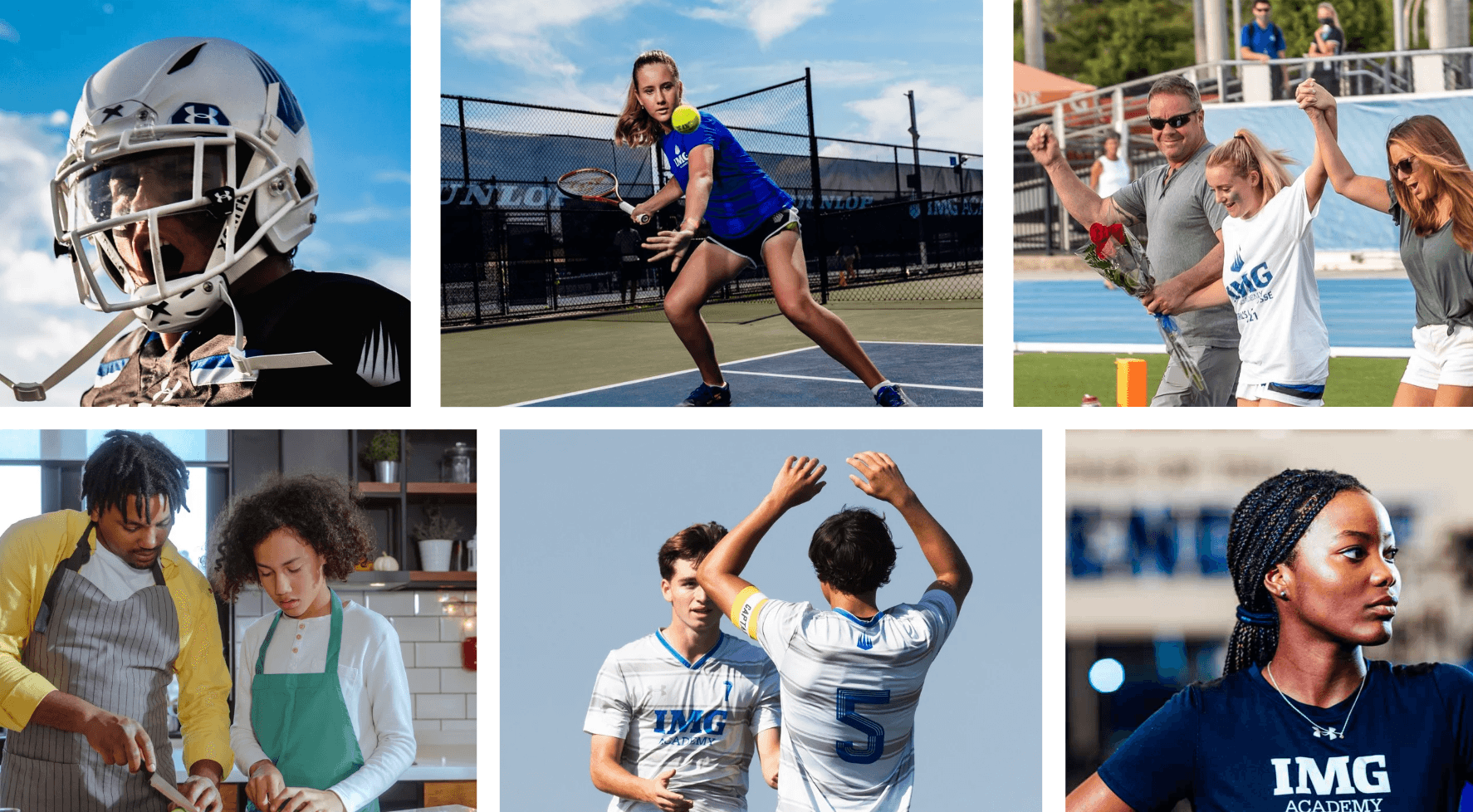7 Ways to Feel Confident In Front Of Coaches

Picture this: You're at the free-throw line with five seconds left to go in the game and you're down by one point. You look up to see the coach from your dream school in the stands. Nerves begin to creep up. What do you do? Allow the fear of missing the shot to overwhelm you, or do you step up with confidence and make the shot?
All athletes struggle with confidence from time to time – yes, even the pros! The fear of making mistakes or falling short of expectations when someone important is watching can create a mental battle inside your head. But putting too much pressure on yourself can have a negative impact on your performance, as well as your mental and physical health, so it's important to learn how to manage this stress in a healthy way.
Is It Normal To Get Nervous When College Coaches Are in the Stands?
Yes, it's totally normal to feel a little anxious or nervous when college coaches are in the stands. You want to make a good impression, and this is your athletic future we're talking about! But the thing is, coaches aren't expecting perfection. Your confidence, poise, the way you react when things don't go your way – these are just as important to college coaches.
Nerves are a natural part of competition, but learning how to manage them can help you become a better athlete in the long run. We've got you covered with 7 confidence-boosting tips that will help you feel cool, calm and collected the next time college coaches are in the stands.
1. Preparation is Key
First and foremost, you need to prepare your mind and body for the game. That means getting enough rest the night before the game, drinking lots of water and eating a healthy meal, so that your body is well-rested and properly fueled to perform. Mentally, you can prepare yourself by reviewing the game strategies from your coach and different scenarios in your mind. Imagine how you and your opponent would react as you run through your plays.
2. Practice Positive Self Talk
The way we talk to ourselves can make or break our performance. Affirmations are a great way to practice positive self-talk. Think of them as your secret weapon for building confidence and feeling great about yourself. By repeating positive statements about your abilities and worth, you create a mindset that can help you excel on the field or court. Say them consistently before a game, during a break or even after the game is over for the best results.
Here are some examples to get you started:
I am a skilled athlete and have the ability to perform at my best level.
I am confident and powerful on the field/court.
I am worthy of success and achieving my dreams.
Visualize Success
Visualization is a powerful tool for athletes to use. It involves using your imagination to create a mental image of yourself successfully performing in your sport. Research has shown that visualization can improve an athlete's performance by enhancing their focus, confidence and motivation. This doesn't mean that you can skip out on your practice and training though! Visualization is just one more tool in your toolbox to help you perform your best on game day.
Here are some tips for using visualization in sports:
Clear your mind. Find a quiet place to relax your mind and clear your thoughts. This can be a helpful way to ensure that you're fully present and engaged in the process.
Use all your senses. Don't just focus on what you see. Incorporate other senses, like touch, smell and sound. The more specific you can be in your visualization, the better!
Get emotional! Instead of just imagining a scene, focus on how you would feel in that scene – confident, happy, excited? Allow yourself to really feel those emotions and have fun.
Challenge yourself. Visualize how you would handle challenging situations, such facing a tough opponent. This can help you to push beyond your current limitations and achieve your goals.
Practice regularly. Like any skill, visualization takes practice. Make it a daily or weekly habit to practice and over time you will get better at it and see the benefits in your game.
See how Olympians Katie Ledecky and Michael Phelps visualize success.
4. Take a Deep Breath
Sometimes, when we're under extreme pressure, we can forget to do something that we've been doing since the day we were born – breathe! Deep breathing can help lower your heart rate and calm your nerves, allowing you to play with confidence. Here's how to use deep breathing exercises before, during and after competition:
Pre-game routine: Incorporating deep breathing into your pre-game routine can help you relax and get into the right mindset for the game.
Time-outs and breaks: Taking a few deep breaths during breaks can help you reset and refocus, especially if you're feeling overwhelmed or anxious.
Before important plays: Using deep breathing before important plays can help you stay calm and focused, so you can perform at your best.
Post-game recovery: Deep breathing can also be used after the game to help you relax and recover. This can help reduce muscle tension and improve recovery time.
Experiment with different breathing techniques and find what works best for you. The next time you feel your nerves getting the best of you, just remember to take a deep breath, embrace your inner Elsa and let it go!
5. Stay Present and Play to Your Strengths
When coaches are in the stands, it's easy to go into impress mode – but that can backfire. Trying to do too much can come off as selfish. Remember, those coaches are there to watch you play because they have an interest in you as a recruit. Trust in your training and play to your strengths. By staying focused on the game and being confident in yourself, you'll impress those coaches without even trying!
6. Keep it Positive
We've said it before, and we'll say it again: Coaches don't just recruit talent! They're watching your body language, your demeanor, everything that shows what type of teammate and player you are. So, when things aren't going your way, don't pout! Keep your head up, shoulder back and find other ways to help your team win. Having a positive attitude displays major confidence in your game.
7. Have Fun and Be Yourself
Remember that little kid in the backyard who just loved playing the game? Be them! Reflect on the reasons why you love your sport and let that drive you. Passion and confidence go hand-in-hand, and more confidence means better performance. It doesn't hurt to show coaches a little personality as well – after all, they're looking for recruits who will make a positive impact on their team. So, have fun and be yourself, and watch as your confidence and talent shine through on the field.
How to Maintain Your Confidence in Sports
Maintaining confidence levels can be challenging but creating a routine can make a big difference! We've shared 7 effective ways to help you get started. With a consistent routine, you'll feel more in control and familiar, which can boost your confidence.
To achieve success, you need to establish habits that work for you. Tailoring your routine to fit your unique preferences and needs is key to forming sustainable habits. By experimenting with different approaches and techniques, you can discover what helps you to be most productive and efficient.
How Our Coaches Built Game Day Confidence
Lindsay Vaughn, NCSA Field Hockey Recruiting Coach and former D1 field hockey player and D1 and D2 coach, danced the gametime stress away!
"One of the things I always tell my student-athletes and constantly had to remind myself as a player was to have fun! You'd catch me dancing to the music during warmups and thinking about how much I just loved to play the game of field hockey. When you're enjoying the moment, everything becomes a blur, and you don't have the chance to overthink it. Game time was when I could just forget about the stress of everything in life and have some fun."
Luis Cortell, NCSA Men's Soccer Recruiting Coach and former D2 soccer player and D1 and D2 coach, adopted a "never stop moving forward" mentality.
"If you miss a shot, it's all good, you got the next one, you are going to score today!"
Heather Evans, NCSA Volleyball Recruiting Coach and former D2 volleyball player and D1, D2 and D3 coach, studied her opponents and visualized success on the floor.
"Our pre-game rituals consisted of reviewing very detailed scouting reports & dissecting the game offensively & defensively for both individuals & teams. After team meetings, we would go into the locker room with all the lights off & visualize our individual roles rep after rep. I recall many times laying on the gym floor in a circle with our coaches guiding us through a visualization as well. Extremely powerful! Seeing is believing & I am convinced all the visualization work I did in those early years allowed me to overcome incredible obstacles both in sport & life."
Andy Drake, NCSA Sr. Baseball Recruiting Coach and former D3 baseball player and coach, prioritized effort and attitude – even when college coaches weren't watching.
"If coaches are there to see you in person, they are there to observe more than just your ability. Have good body language, be attentive when coaches are talking, hustle on and off the field, pick up your teammates, be respectful of the officials/umpires, look like you are having fun and enjoy playing the game! Don't only do these things when you think a coach is watching – play every game like there is a coach in the stands."
What if Your Nerves Get the Best of You?
Everyone has a bad game or performance from time to time, but it's important to remember that it doesn't define you as an athlete. You'll have multiple chances to show what you're capable of. So, if you make a mistake or have a bad game when a coach is watching, don't get discouraged. Instead, use it as an opportunity to learn and grow. Coaches appreciate players who have a growth mindset and are always looking for ways to improve. By staying positive and dedicated, you can build confidence and success in both the recruiting process and your sport.
Want more recruiting tips? Get started with a recruiting profile.
Like this article? Access more in the full resource library.


Start Achieving Your Goals With Essentials
- Unlock the full Essentials experience
- Get recommended content based on your interests
- Dive into content on mental performance, nutrition, college recruiting, sports training and so much more!